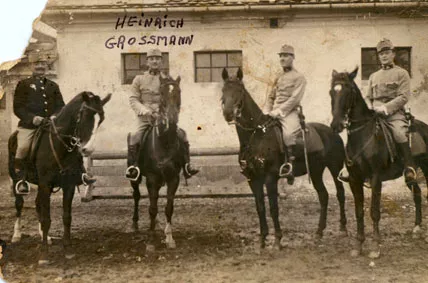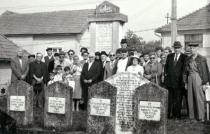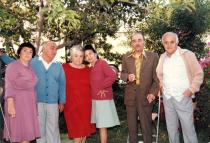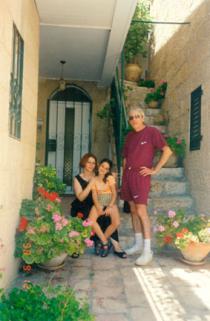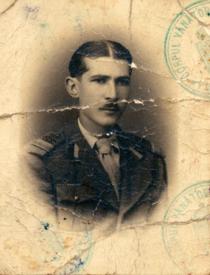This photo shows the elder brother, Heinrich Grossmann of my husband Fulop Grossmann, he’s the second from left. He must have sent it as a postcard, because it is written on the back: “To Mrs. Ilonka Samuel, Zilah, Post office box. Kind regards and happy holidays, Henrik.” The stamp on it is dated April 1915.
My husband’s father was a merchant. Formerly women had many children, and died at a young age. The wife of my husband's father, of Abraham Grossmann died too. Then my husband's father married again, all his children left from home, he was alone, and he married a girl from Ludas, who came from a very rich family. And he wasn't young, he was fifty-seven or fifty-eight years old, when he got married for the second time, and he was sixty years old when my husband was born, I didn't believe it when he told me. My husband's mother was Sarolta Fischer - she was forty-six years old when my husband was born -, she died of pneumonia in 1937, on the 26th of the month of Elul. His father was old when he died, he died in 1933, in the month of Cheshvan, on 1st October.
There were many siblings, there were some five girls and four boys. The former Jewish families were like this. There were such large families. Because a wife died, he married another wife, they had children too. There was Vilma, Jeno, Veronka, Hersi, Heinrich, Blima, Berta and my husband. Only her elder sister, Frida was his full sister.
Heinrich Grossmann died during World War One. He came home from the frontline, they let him go home, because he felt bad, and he died of Spanish flu within one week. He was a very handsome man, they called him Buba, because he was so nice like a little 'buba' [doll]. He wasn't married, well, he was very young, but according to his rank he was a second lieutenant. He's buried here, in the cemetery of Des, his gravestone is there for ninety years, but it looks as if they put it there now, it looks so nice.
